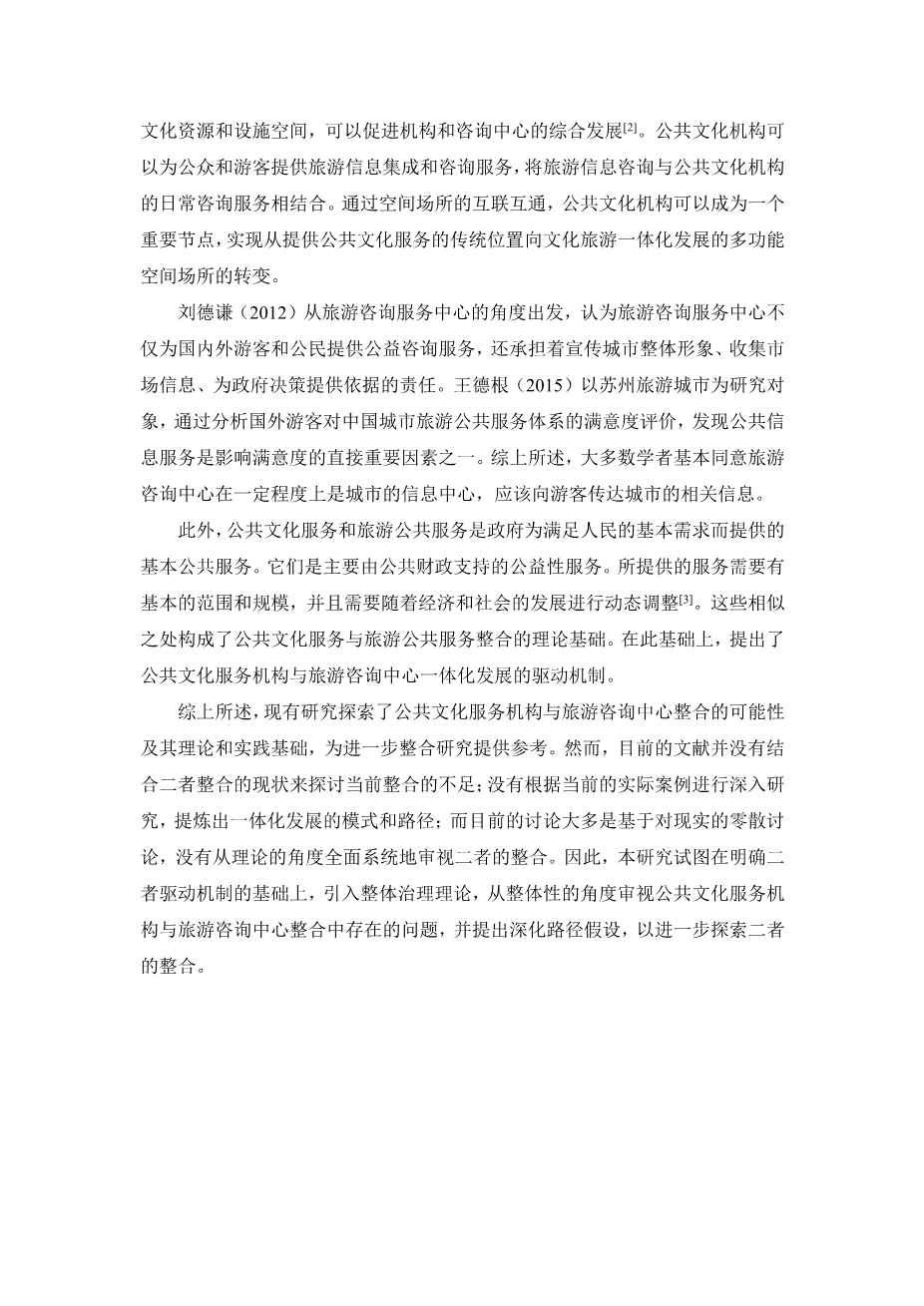Research on the Integration of Public Cultural Service Institutions and Tourism Consulting Centers--Based on the Theory of Holistic Governance
Guo Tingting1*, ZHANG He-qing1 , WANG Lei-lei2
Sonrce: Academic Journal of Humanities amp; Social Sciences ISSN 2616-5783 Vol.3, Issue 9: 36-42.
- Introduction
In 2018, the Ministry of culture and tourism officially launched, marking the formal integration of culture and tourism. For a time, the integration of culture and tourism has become a hot topic in the cultural, tourism and even academic circles. Culture and tourism public service -- the integration and development of public cultural service and tourism public service is also an important aspect of the integrated development of culture and tourism. The law of the peoples Republic of China on the protection of public cultural services clearly defines “public cultural services”, which refers to “public cultural facilities, cultural products, cultural activities and other related services provided for the main purpose of meeting the basic cultural needs of citizens under the leadership of the government and participated by social forces” (Article 2), which defines public cultural services from the legal level The main body of responsibility, service purpose and content.
At present, there is no specific definition of tourism public service in the legal level. The tourism law of the peoples Republic of China puts forward the development policy of “improving tourism public service” (Article 3). The tourism public service matters involved in the law mainly include the establishment of tourism public information and consultation platform, the setting up of tourism consultation center, the setting up of tourist signs, the establishment of tourist transfer station (Article 26 above), and the establishment of tourism emergency response mechanism( Article 78). At present, there is a more influential saying in academic circles that “tourism public service refers to the general name of products and services with obvious public nature provided by the government or other social organizations, with the core of meeting the common needs of tourists, non-profit-making purpose and obvious public nature” proposed by Li Shuang (2012)[1].
- The Internal Mechanism of the Integration
At present, some scholars have studied the integration of culture and tourism and its related fields, but they mostly focus on the integration of cultural industry and tourism industry, the integration of cultural public service and tourism industry, or the integration and measures of cultural industry and tourism public service, while the research on the integration of public cultural service and tourism public service is less. By sorting out the literature, the author roughly combs out the possibility of the integration of the two.
From the perspective of public cultural service institutions, Jin Wugang et al. (2019) believe that public cultural services have cultural resources and facilities space to promote the integrated development of institutions and consulting centers[2]. And public cultural institutions can provide tourism information integration and consultation services for the public and tourists, and integrate tourism informationconsulting with daily consulting services of public cultural institutions. Through the interconnection of space places, public cultural institutions can become an important node, and realize the transformation from the traditional position of providing public cultural services to the multi-functional space places with cultural and tourism integration development.
From the perspective of Tourism Advisory Service Center, Liu Deqian (2012) thinks that tourism advisory service center not only provides public welfare consulting services for tourists and citizens at home and abroad, but also undertakes the responsibility of publicizing the overall image of the city and collecting market information to provide basis for government decision-making. Wang Degen (2015) took Suzhou tourism city as the research object, and through the analysis of foreign tourists satisfaction evaluation of Chinas urban tourism public service system, he found that public information service is one of the direct and important factors affecting satisfaction. To sum up, most scholars basically agree that the tourism consulting center is the information center of the city to a certain extent, and should convey the relevant information of the city to tourists.
In addition, public cultural services and tourism public services are the basic public services provided by the government to meet the basic needs of the people. They are public welfare services mainly supported by public finance. The services provided need to have basic scope and basic scale, and they need to be adjusted dynamically with the development of economy and society[3]. These similarities constitute the theoretical basis for the integration of public cultural services and ourism public services.Based on this, this paper puts forward the driving mechanism of the integration development of public cultural service institutions and tourism consulting centers.
To sum up, the existing research explores the possibility and theoretical and practical basis of the integration of public cultural service institutions and Tourism Advisory centers, providing reference for further integration research. However, the current literature has not combined with the current situation of the integration of the two to explore the shortcomings of the current integration; there is no in-depth study based on the current practical cases to extract the mode and path of the integration development; and most of the current discussion is based on the scattered discussion of reality, not fr
剩余内容已隐藏,支付完成后下载完整资料


英语译文共 2 页,剩余内容已隐藏,支付完成后下载完整资料
资料编号:[589673],资料为PDF文档或Word文档,PDF文档可免费转换为Word
以上是毕业论文外文翻译,课题毕业论文、任务书、文献综述、开题报告、程序设计、图纸设计等资料可联系客服协助查找。


